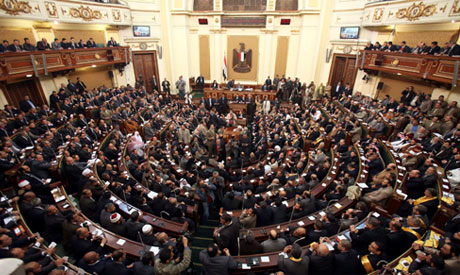 The fate of the People's Assembly – the lower house of Egypt's parliament – appeared to have been laid to rest on Saturday when the Supreme Administrative Court (SAC) ruled in favour of an earlier decision by the High Constitutional Court (HCC) to dissolve the Islamist-led assembly. While a majority of Islamist figures have vowed to contest the decision, liberal and leftist forces hailed the move.
The fate of the People's Assembly – the lower house of Egypt's parliament – appeared to have been laid to rest on Saturday when the Supreme Administrative Court (SAC) ruled in favour of an earlier decision by the High Constitutional Court (HCC) to dissolve the Islamist-led assembly. While a majority of Islamist figures have vowed to contest the decision, liberal and leftist forces hailed the move.
The Muslim Brotherhood's Freedom and Justice Party (FJP), for its part, which had held almost half the seats in the assembly, slammed the verdict.
"The atmosphere in which the verdict was issued raises questions," read a statement issued by the FJP's legal committee only hours after Saturday's verdict. "The court had earlier decided to adjourn the case while a ruling came later in another case."
The party here was alluding to the fact that on Saturday a similar case challenging the assembly's dissolution was adjourned by the SAC until mid-October. However, only hours later, the court ruled in favour of the earlier HCC verdict, confirming the assembly's dissolution.
The FJP went on to call for "transparency from the court instead of conflicting positions," adding that the party planned to take additional legal action in response to the controversial ruling.
FJP lawyer Mohamed Abu-Baraka described Saturday's ruling as "a disaster in the history of the Egyptian judiciary."
Couching his reasoning in legal terms, Abu-Baraka stated that the HCC ruling was "legally flawed," given that Egypt's March 2011 Constitutional Declaration – approved via national referendum – protected the country's freely-elected parliament from dissolution.
The "people's choice," Abou-Baraka asserted, should transcend "any other entity's ability to dissolve the assembly."
He went on to state that neither the courts, the presidency, nor the military could legally enforce such a decision. "The HCC ruling has to a large extent contributed to tarnishing Egypt's democratic transition," he asserted.
Not all Islamist figures, however, took issue with the ruling. Hossam Eddin Mostafa, media spokesman for the Muslim Brotherhood in Egypt's expansive Wadi El-Gedid governorate, stated that the group would respect the verdict.
"This [ruling] will allow us to prepare for upcoming parliamentary elections, whenever they will be held," he said.
Liberal and leftist forces, meanwhile, which had held less than 30 per cent of the seats in the now-dissolved assembly, welcomed the verdict.
Amr Moussa, former liberal presidential candidate, stated that court rulings must be respected.
"Respect for the rule of law is a main principle that must be upheld to ensure stability in the political arena and respect for the state and people," Moussa asserted.
As head of the newly established Egyptian Conference Party, Moussa stressed the importance of uniting the country's secular forces so as to capture a larger share of parliamentary seats in upcoming polls.
Reform campaigner and founder of the new Constitution Party, Mohamed ElBaradei, also praised Saturday's court ruling.
"The verdict that confirmed the dissolution of parliament is a first step for those in power to understand that legislation is the main pillar for building the county," ElBaradei declared. "A balanced Constituent Assembly [tasked with drafting the new constitution] is the second step of that process."
Dissolution of the People's Assembly has been the subject of considerable controversy since the HCC's initial 14 June ruling to this effect. The Muslim Brotherhood, together with other Islamist parties and groups, had vociferously opposed the verdict, with a number of Islamist lawyers appealing the decision.
Upon his inauguration in late June, President Mohamed Morsi, who hails from the ranks of the Muslim Brotherhood, had attempted to unilaterally restore parliament's lower house. A presidential decree to this effect, however, was quickly overturned by Egypt's then-ruling Supreme Council of the Armed Forces.
Other controversial cases still awaiting a final court decision include a case against the constitutionality of the Shura Council (parliament's upper, consultative house) and a similar case against the Constituent Assembly (tasked with drafting a new constitution), members of which were chosen by the now-dissolved People's Assembly.



